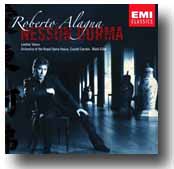REVIEWS
Nessun Dorma CD
Arias by Cilea, Ponchielli, Wolf-Ferrari, Leoncavallo, & Catalani
Roberto Alagna (tenor), Orchestra of The Royal Opera House Covent Garden, Mark Elder (conductor)
EMI Classics

Nessun Dorma, ClassicsToday, November 2003
Roberto Alagna: Nessun Dorma, San Francisco Examiner, 4 November 2003
_______________________________________________________________
Nessun Dorma
Robert Levine, ClassicsToday, November 2003
After recital discs devoted to bel canto, French opera, and Berlioz, Roberto Alagna here tries to put an individual stamp on some very familiar tenor arias and a few not-so-familiar, all from Italian "verismo" operas. The danger is oversinging; these operas, particularly those by Mascagni, require a type of exclamation that almost implies shouting. For the most part, Alagna is successful--mostly brilliantly so.
The voice is in superb shape, with little of the pinching at the top that occasionally has crept into his work, and he continues to be a "thinking" tenor, approaching even the very famous works with a fresh eye. Even the opening "Nessun dorma" reflects a musical intelligence (this aria also closes the CD, in a version "in context"--that is, with chorus, as it is performed in the opera). It begins hushed, as if neither we nor Calaf know that it is a whopping show-stopper, and builds as an internal monologue. He takes a fine diminuendo on the word "splendera", as most tenors do, but he doesn't breathe right before it announcing an "occasion". Rather, it is more organic. Similarly, in his reading of "Cielo e mar" we can sense Enzo gazing outward from his ship; it's beautifully, sensitively phrased, without the odd rallentandos most tenors add for emphasis. It makes you like the aria again after so many years of hearing it yelped.
An aria from Zandonai's Giulietta e Romeo is just heartbreaking, with Romeo caressing thoughts of his (not quite) dead Giulietta, and he exhibits fine passion, only resorting to a bit of yelling once or twice, in Chenier's two arias. The Brindisi from Cavalleria is energetic and macho (with chorus and Lola, no less); the "Addio" is heartfelt, although Alagna flies so sharp on the big B-flat in the "na" syllable in "tornassi" that you have to wonder if he misread it as a B-natural. You might chalk that up to overexcitement with the situation, but he hits both Gs sharp in the softer-hued "Amor ti vieta" as well; singing sharp apparently is an unfortunate predisposition.
A song from Wolf-Ferrari's Sly is biting and colorful, and we get a terrific picture of this drunken poet. Oddities from Leoncavallo's I Zingari and Chatterton make us want to hear more of these operas. In all, this is a very persuasive, varied, and beautiful recital, in which four-fifths of the time Alagna never sacrifices the lyrical line and always keeps an eye on the dynamics of an aria. Under and around the needed bravura are the morbidezza and class of Carlo Bergonzi. Mark Elder and the tenor have clearly thought this recital through and the accompaniments are excellent, as are the sonics. And the tendency to sing sharp? Maybe we'll just have to live with it.
Roberto Alagna: Nessun Dorma
T. Hashimoto, San Francisco Examiner, 4 November 2003
With the death last week of Franco Corelli, one is reminded that the
great Italian tenor received the same kind of disrespectful reviews
that Alagna is now suffering. We'll be sorry when he's gone, but at
the moment, try to enjoy the rich, throbbing tenor and musical
imagination of this French-Sicilian artist, and stop worrying about
whether he is perfect or the second coming of Caruso.
He's not, and he always appears to better advantage in French music,
yet this compilation of Italian tenor arias, opening and closing with
Calaf's "Nessun dorma," offers some yummy stuff, including pieces
from "Sly," "La Wally," Leoncavallo's "Zaza," "Chatterton," "I
Zingari" and "La Boheme" (the tenor sings Marcello) and
Giordano's "Cena delle beffe," "Fedora" and "Andrea Chenier." A
keeper.
This page was last updated on: November 6, 2003